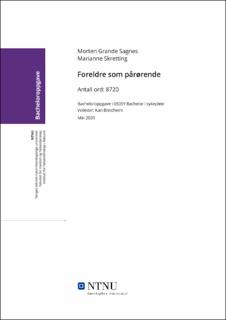| dc.contributor.advisor | Blindheim, Kari | |
| dc.contributor.author | Sagnes, Morten Grande | |
| dc.contributor.author | Skretting, Marianne | |
| dc.date.accessioned | 2020-07-07T16:07:17Z | |
| dc.date.available | 2020-07-07T16:07:17Z | |
| dc.date.issued | 2020 | |
| dc.identifier.uri | https://hdl.handle.net/11250/2661198 | |
| dc.description.abstract | Hensikt: Hensikten med oppgaven er å undersøke hvordan foreldre mestrer situasjonen når deres barn innlegges på sykehus med kreft.
Metode: Systematisk litteraturstudie med åtte inkluderte forskningsartikler.
Resultat: Foreldre bruker en rekke forskjellige mestringsstrategier for å håndtere situasjonen med sitt kreftsyke barn innlagt på sykehus. Det viste seg at foreldre hadde best utbytte av følelsesfokuserte mestringsstrategier. Riktig informasjon og god kommunikasjon fra helsepersonell, på foreldrenes premisser, var viktig for å kunne klare å mestre situasjonen.
Konklusjon: Foreldre i studiene hadde et stort behov for informasjon for å kunne mestre situasjonen. Sykepleier bør finne ut hvordan informasjonen skal formidles til den enkelte. Opprettholdelse av foreldrerollen og deltakelse i barnets sykdomsforløp var viktig. Foreldre tok i bruk forskjellige mestringsstrategier for å mestre situasjonen, og følelsesfokuserte mestringsstrategier gikk mest igjen. Studien viser at gode kommunikasjonsferdigheter, klinisk kompetanse og at foreldrene følte seg sett og anerkjent av sykepleier, bidro til mestringsfølelse med mindre sannsynlighet for negative konsekvenser i fremtiden. | |
| dc.description.abstract | Purpose: The purpose of this paper was to examine how parents coped with the situation were their child was hospitalized with a cancer diagnosis.
Method: A systematic literature study including eight research articles.
Result: Parents used many different coping strategies to handle the situation of their child hospitalized with cancer. Findings proved that parents coped best when using emotion-focused coping strategies. Correct information and good communication from healthcare professionals on the parents´ premises was important for them to cope with the situation in the best possible way.
Conclusion: Parents in the studies had a big need for information to cope with the situation. Nurses should find out how to best convey information to each individual parent. Maintaining the parent-role and participation in the child’s course of illness was important. Parents used different kinds of coping strategies to cope with the situation and emotion-focused strategies was most significant. Good communication skills, clinical expertise, and that parents felt recognized by nurses, contributed to a sense of coping and less likely to get any negative consequences in the future. | |
| dc.publisher | NTNU | |
| dc.title | Foreldre som pårørende | |
| dc.type | Bachelor thesis | |
